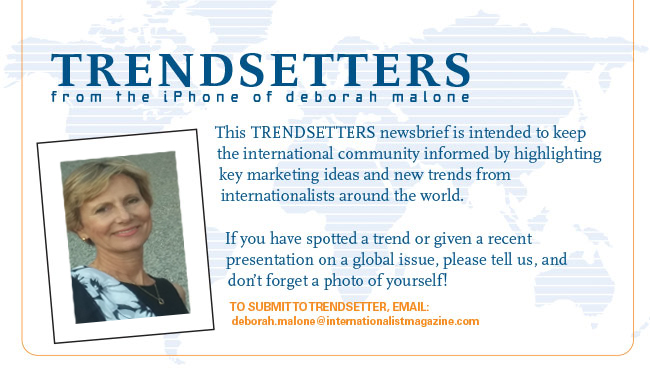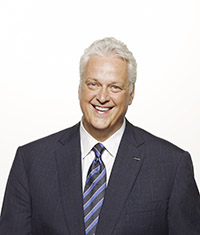

Tim Andree
See the current issue
of The Internationalist magazine
Find out how to sponsor an issue of Trendsetters
Trendsetters: Dentsu's Tim Andree Looks at a Changing Agency Business in a New Light
Tim Andree, Executive Chairman of the Dentsu Aegis Network and Executive Vice President and member of the Board of Dentsu, would be the first person to admit that his agency network is building something "different," and not a traditional holding company model. However, if different today means being a talent magnet, demonstrating extraordinary management stability, and delivering 10.3% gross profit on organic growth in 2014 on international business, then many would gladly be in his shoes.
"In the midst of globalization and convergence, we are living in a complex environment for clients," says Andree. "It's not complicated; it's complex. And we have to mitigate the cost of complexity for our clients. We have to organize so that our talent is used to provide the best solutions in an environment where collaboration is valued--not just at scale, but across the organization and across geographies."
Tim Andree's career is the stuff of legend: from humble beginnings and a love of basketball that ultimately led him to Japan and client-side roles at Toyota and Canon to today's responsibility for all of Dentsu's operations outside of Japan. His milestones along the way are extraordinary in terms of expansion and fast growth, a focus on innovation, and a rare team-oriented point of view that undoubtedly comes from a true love of sport and knowing-- first-hand--what it really takes to win the game.
Dentsu's 2013 acquisition of Aegis Media, the largest transaction in the company's history, occurred with Tim Andree's strategic guidance. He was appointed Executive Chairman of Dentsu Aegis Network, a new global operating unit overseeing all the operations of Dentsu Network and Aegis Media, and also became a member of the board of directors of Dentsu Inc., as the company's first non-Japanese director. During this time, Dentsu also became the fastest-growing network in the US--increasing overseas revenue from 5% to 15%. Since the acquisition of Aegis, revenue from outside of Japan is over 50%-- creating not only a significant shift, but a remarkable balance.
When Tim Andree talks about the evolution of his role at Dentsu, he underscores how the company's current growth stemmed from "simple plans." He says, "It's about culture, values and motivating people. When I joined Dentsu, we had great talent in Japan, but our talent was few and far between in the rest of the world. It was clear we needed a deep bench of global managers who were aligned, focused, motivated, and who understood that a headquarters in Tokyo provided a unique global perspective in a world where increased GDP growth would come from Asia."
He emphasizes, "Everything we've done is working from client need. Essentially, we recognize that our clients face two major challenges--globalization and convergence. Yet, these two issues also represent the opportunity for transaction and engagement in a borderless, digital world. Yes, this means operating in a complex environment. We are a service business, so we have to figure out how to mitigate the cost of this for our clients. Marketing today is central to their businesses, and we have to push ourselves to be at the center of data, ecommerce and mobility in a world where more transactions mean more data. We must have the ability to bring together the right specializations in an integrated way to create holistic solutions for our clients, for our employees, and for our shareholders."
Dentsu, of course, has always had a "through the line" mentality, and continues, for example, to keep creative and media under the same roof. "We believe in integration with key specializations. When we acquire, we are cautious. Not every company is right for us. We aim to retain all talent and leadership, then build a beneficial matrix where roles are clarified, but the entire organization is designed for collaboration. All compensation, bonuses, and behaviors are geared to integrate services for the greater good of our clients."
He admits that there was great industry skepticism about the potential for success of an Aegis acquisition by Dentsu. "People assumed that a Japanese company and British company wouldn't work. But I think culture, and cultures can be different as long as they share values and visions. They can be homogenized even with great diversity. Plus, a different culture can add a lot to an organization when driven to accomplish the same mission."
Andree adds that Dentsu and Aegis were complementary from the start. "Dentsu was strong in Asia, Aegis was strong in Europe, and both were growing rapidly in the Americas. Both companies believed in eliminating silos. Dentsu operated on a single, integrated P&L. Aegis was doing the same. Our emphasis was on creating synergies and learning from each other, especially in regard to business models that worked." Today, of course, the acquisition is considered a success with net new business wins of nearly $9 billion in billings achieved from the time of completion of the acquisition to date. Ninety percent of management was retained.
Overall, Tim Andree believes that Dentsu's role is to support acquired companies, respect their individuality and cultures, but also help make them better. Counter to most industry trends, Dentsu's acquisitions often have their best years after their purchase. He cites how Mcgarrybowen and 360i have had successive years of strong growth after becoming part of Dentsu.
When asked about the magic he enables, Tim Andree simply states, "A new kind of network requires new kinds of people. Our goal is innovating the way brands are built."
He adds, "Our strategy is not to simply buy companies. Acquisition is to help meet our clients' strategies. Companies are valuable cultures, not assets. Shared, common visions matter, and it is a competitive advantage when people are aligned. Scale isn't everything any more. Of course, scale matters, but what matters more is momentum--ask any athlete. We believe we are creating a new momentum. When people are winning, you create the kind of spirit that really gets people engaged."
Tim Andree is also well-known for shifting attention from himself and focusing it on the executives who run his companies. His team sensibility and drive to put the needs of clients and the organization first, makes him a rare CEO these days. Interestingly, he has often been quoted as saying, "There are people in business that think leadership is power and control, and people who think leadership is service. That's why I'm comfortable at Japanese companies."
For those unfamiliar with Japan's deeply-ingrained devotion to service, bear in mind that it is common knowledge to accept that "the customer is god." In the US, of course, he's only king.

